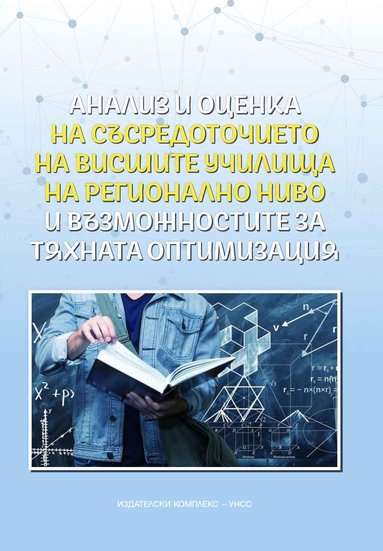Анализ и оценка на съсредоточието на висшите училища на регионално ниво и възможностите за тяхната оптимизация
Analysis and assessment of the concentration of higher schools at regional level and opportunities for their optimization
Author(s): Nikolay Tsonkov, Simeon Zhelev, Daniela Todorova, Nadya Mironova, Kamen Petrov, Tsvetelina Berberova-Valcheva
Subject(s): Social Sciences, Economy, Education, Higher Education , Socio-Economic Research, Sociology of Education
Published by: Университет за национално и световно стопанство (УНСС)
Keywords: higher schools; economy, regions' spatial development; regions' smart specialization; universities' territorial location
Summary/Abstract: The development of the educational structure of the Bulgarian state is an important and fundamental process, which to a large extent embodies the pace of socio-economic development of the country and our place in the modern world. Experience shows that the search for opportunities to form a balanced territorial system of higher education can be a decisive factor in supporting the process of transformation of the national economy into a green economy. This will also provide more opportunities for Bulgarian higher education, which is subject to the natural competition caused by the competitiveness of the European education space and, on the other hand, the emerging demographic crisis in the country. The major purpose of the study is - to evaluate and analyze the co-location of higher education institutions at the regional level and the possibilities for their optimization". The study is structured in six parts - introduction; methodological framework and theoretical approaches to higher education in Bulgaria; university education in the Bulgarian state in the context of the European educational area; results of research conducted on the labour market and business needs; in-demand specialists in municipalities; analysis of digital platforms for labour supply and demand; summaries and conclusions; and conclusion. The authors draw several conclusions and findings in more concrete terms: Higher schools in this country must work hard to meet funding and regulatory criteria. In parallel, they need to strengthen their market position in the provision of educational services. In the Bulgarian version, a pattern of concentration is visible, which is accompanied by the institutional strategy of situating education in a few main centres. A structural determinant or factor in achieving a higher standard of living for the population and an educated environment is the role of the education system, and in particular the generation of human capital through the presence of a higher education institution in the territory concerned. Attractiveness is increased as a result of the strategic partnership between state, higher schools and business, which sets the basic foundation for innovation and hence attracting investment. In this case, the goal of the strategic partnership is to promote and implement new technologies in production and management, thus preparing the professional community for the new type of innovation economy.
- Print-ISBN-13: 978-619-232-593-0
- Page Count: 236
- Publication Year: 2022
- Language: Bulgarian
- Table of Content
- eBook-PDF
- Introduction

